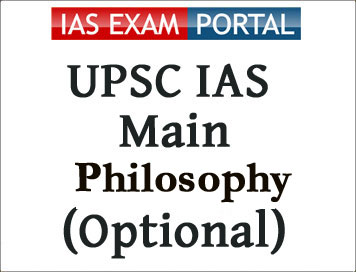UPSC Main: Strategy for Philosophy Optional
UPSC Main: Strategy for Philosophy Optional
Section A:
Philosophy as an optional subject has become very popular in UPSC. As we know, it has monopolised State Services already. Philosophy has shortest syllabus so it can be prepared within minimum time with reasonable effort. Generally students think that Philosophy is absurd subject and it has no practical relevence but it is not true picture of the subject. Philosophy is very analytical and speculative that makes it very interesting and highly scoring.
The syllabus of ‘Preliminary examination has three sections : Section A, B and C. Section A is Problem of philosophy’. Here we are concerned with Indian Philosophy and Western Philosophy. So we have to read them thoroughly. The questions are generally asked on terminology and theories like ‘What is Pratitya Samutpada?’. We must have understanding of terms and theories. In Indian Philosophy there are nine schools. Six schools are orthodox (Samkhya Yoga, Nyaya, Vaisheshika Mimansa and Vedanta) and two are heterodox (Jainism and Buddhism). One other school is Materialism. UPSC generally asks questions in Indian philosophy on some specific points like substance, attributes. In western philosophy there is no precise syllabus. Generally questions are asked from Thales to Sartre.
Section B:
deals with Logic. Here we have to read only seven topics from Irwin M. Copi. Plus we have to study Symbolic Logic by Dr. Ashok Verma. Generally 30-35 questions are asked from logic in Prelims. 20 questions are just theoretical : they do not need any explanation. 5-8 questions are on Quantification which also can be answered at first sight if you have already practised. Remaining 5-8 questions are from Deduction which need explanation : this depends upon your practice and even these are not decisive.
Section C:
deals with Ethics. It consists of Indian Ethics and Western Ethics. In Indian Ethics questions are from Charvaka to Vedanta. Dr. Divakar Pathak’s book on Indian Ethics is essential for this section. In Western Ethics, questions are from Thales’ to Advanced Ethics. Here we have to study Thilly and another book by Dr. V.P. Verma. The question in this section are generally factual so we have to collect facts and memorize them.
As far as Mains syllabus is concerned it is divided into Two papers — Paer I and Paper II. Paper I deals with Indian Philosophy and Western Philosophy. Here we have to attempt 5 questions out of 8. 2 questions are compulsory which are generally on specific topics. The compulsory question of Indian philosophy is generally on epistemology or it can be a short note. In Western Philosophy the compulsory question is mostly a short note. The first paper is highly scoring because all the questions are predictable. We have to critically examine the questions and give as many comments as possible. The questions are generally direct like refutation of inference given by Charvakay Syatvada and Anekantavada in Jainism, Pratitya Samutpada and Kshan Bhangvada in Early Buddhism, Shunyavada and Vigyanvada in Later Buddhism, Purush prakriti and Theory of Evolution from Samkhya, categories and atomism from Vaisheshika, Brahma and Maya from Sankara, Qualified non-dualism and refutation of Mayaism from Ramayanya. These are the common questions on Indian Philosophy which are generally asked in UPSC. In Western philosophy, theories of ideas of Plato, substance and form of Aristotle, ‘Cogito ergo sum’ of Descartes, substance or pantheism of Spinoza, monadology of Leibnitz, Esse est percipi of Berkeley, Scepticism of Hume, Synthetic a priori judgement of Kant, Truth is rational and rational is truth of Hegel, appearance and reality of Bradley, Radical empiricism of James, Common sense philosophy and refutation of idealism of Moore, Logical atomism and Theory of Description of Rusell, Eliminaation of metaphysics and verification theory of Ayer, Picture theory and language game of Wittgenstein, Category mistake of Ryle Nothingness of Heidegger, Existence precedes essence and man is condemned to be free of Sartre— all the common questions of Western philosophy.
Paper II has 2 sections and there are also 2 compulsory questions in each sections (one from each section). Philosophy of religion and Socio-political philosophy are the 2 sections of Paper II. Philosophy of religion is very short. There are only 7 topics in the whole syllabus and always 1 question from each topic. If certain specific topics are covoered, philosophy of religion can be covered easily. In the section of socio- political philosophy there are 11 topics given inour syllabus. There are some topics which are invariably asked like Sarvodaya, Gandhism, comparison between Marxism and Gandhism and sort notes are always on political ideals (equality, liberty, sovereignity and justice).
Prelims:
Section- A Problem of Philosophy
1. Dr. C.D. Sharma (Indian Philosophy)
2. Dr. Deo Raj (Indian Philosophy)
3. Dr. Ya Mashiha (Western Philosophy)
4. Dr. Daya Krishna (Western Philosophy)
5. Dr. Franckena Thilly (Western Philosophy)
6. Dr. B.K. Lal (Contemporary Western Philosophy)
Section- B Logic
1. Dr. Irvin M. Copi 2. Ashok Verma (Symbolic logic)
Section- C Ethics
1. Dr. Divakar Pathak (Indian Ethic)
2. Dr. Dr. V.P. Verma (Western Ethic)
3. Dr. B.N. Singh (Ethics)
4. Lilly (Ethics)
Section- A Western Philosophy
1. By Franckena Thilly
2. Dr. C.D. Sharma
3. Dr. Dayakrishna
4. Dr. Ya Mashiha
5. Dr. B.K. Lal 6. Dr. Lakshmi Saxena
Section- B Indian Philosophy
1. Dr. C.D. Sharma
2. Dr. Deo Raj
3. Dr. Hiriyanna
4. Dr. Radha Krishnan
Section- C Socio Political Philosophy
1. Dr. J.P. Sood Vol IV
2.Dr. Shiv Bhanu Singh
3. Dr. Gauba
Sec. B Philosophy of Religion
1. Dr. Ya Mashiha
2. John Hick
3. Dr. V.P. Verma


